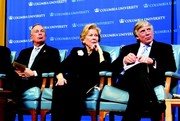News
Neuroscience Research Proposed for M�Ville
By Erin Durkin Spectator Staff Writer
March 21, 2006
University President Lee Bollinger announced Monday that a major component of Columbia�s proposed Manhattanville campus would be the Jerome L. Greene Science Center, a $200 million center housing the University�s Mind, Brain and Behavior Initiative.
The official announcement is the latest indication of how Columbia plans to use the 18-acre area it is seeking to develop. The University had previously indicated that about a third of the space would be dedicated to science labs. A new research building slated to be built on the north side of 125th Street in the first phase of development, spanning the first 10 years of construction, is a potential home for the center, which Bollinger said in a University-wide e-mail would be �the world�s preeminent center for education and research in the neurosciences.� Other plans for the site include a new building for the School of the Arts, a public magnet school, and various administrative offices.
 Standing by Bollinger�s side at the announcement were Mayor Michael Bloomberg and Congressman Charlie Rangel (D-Harlem), who represents the proposed expansion area. While the expansion plan has generated considerable opposition from many local residents and business owners, both men have generally been supportive of the plan.
Standing by Bollinger�s side at the announcement were Mayor Michael Bloomberg and Congressman Charlie Rangel (D-Harlem), who represents the proposed expansion area. While the expansion plan has generated considerable opposition from many local residents and business owners, both men have generally been supportive of the plan.Describing Columbia as �one of the City�s great educational institutions and partners,� Bloomberg said that �the establishment of The Jerome L. Greene Science Center solidifies our city�s place on the forefront of leading scientific research and ensures Columbia�s position as a national leader in the study of neurological and behavioral sciences.�
Skip image

DANIELLA ZALCMAN�CDS
Michael Bloomberg, Dawn Greene,
and Lee Bollinger attend a press
conference announcing Greene�s
$200 million donation toward the
creation of a building named for
her late husband.
This is the second time Bloomberg has appeared with Bollinger at an expansion-related event; in October, he participated in the announcement of a public magnet school for math and science slated to be built on the new campus.
Rangel also voiced strong support. �The Greenes� tremendous support of Columbia and other prominent New York institutions has greatly benefited our education, culture, and healthcare,� he said at the announcement . �The Jerome L. Greene Science Center will expand Columbia�s capacity for innovation and will carry New York into a new age of discovery and leadership in science and medicine. The Center promises to achieve breakthroughs that will benefit the City, the nation, and the world, and I am proud to support it.�
While referring indirectly to disagreements between Columbia and the community, he praised Columbia�s outreach efforts. �I am pleased that Columbia is working to gain the support of the community and will work together to gain the necessary approvals so we can begin work on this important project for Harlem and New York,� he said.
Community Board 9 Chairman Jordi Reyes-Montblanc also expressed support for the center, though he said it was not tied to his position on the expansion project as a whole. �Personally I think it�s great that such research with its promised benefits to humanity will take place in our District. The matter of the expansion and discussions and negotiations that may ensue are not directly connected to this project,� he wrote in an e-mail.
Bollinger said that placing the Mind, Brain and Behavior Center in Manhattanville would serve as a link between the Morningside Heights campus and the Medical Center campus in Washington Heights.
�We have this uptown campus and this downtown campus, and yet we don�t find ways to have them interact,� he said. �With everything I do, I want undergraduates involved. This gives our undergraduates ways to work with our uptown campus as well.�
Bollinger also portrayed the center as a way to reach out to the community. �The Center also would be situated close to the new public secondary school specializing in science, math, and engineering that Columbia is working with the city to establish, which would allow for new knowledge to be imparted to the school�s teachers and students,� he said in the broadcast e-mail.
Additionally, Bollinger said that the center, which will be led by neurobiologist Thomas Jessell and Nobel laureates Richard Axel and Eric Kandel, would �establish an educational outreach facility and clinical programs with a focus on childhood developmental disorders and diseases of the aging brain.� University officials explained that the University was considering providing some outpatient care in the new facility.



No comments:
Post a Comment